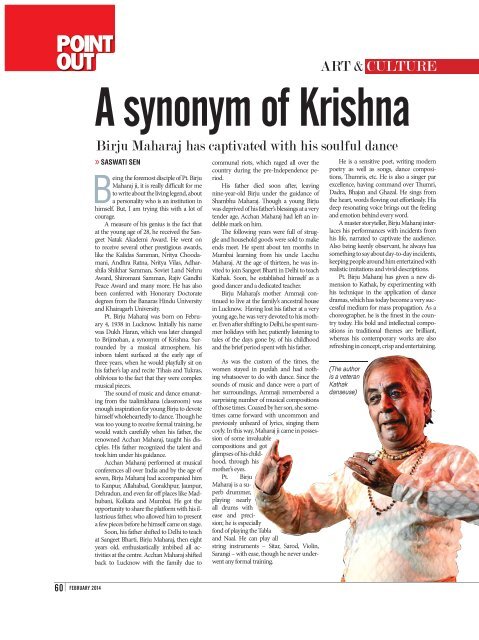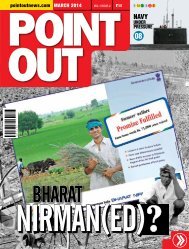POINT OUT
Create successful ePaper yourself
Turn your PDF publications into a flip-book with our unique Google optimized e-Paper software.
<strong>POINT</strong><br />
<strong>OUT</strong><br />
ART & CULTURE<br />
A synonym of Krishna<br />
Birju Maharaj has captivated with his soulful dance<br />
» SASWATI SEN<br />
Being the foremost disciple of Pt. Birju<br />
Maharaj ji, it is really difficult for me<br />
to write about the living legend, about<br />
a personality who is an institution in<br />
himself. But, I am trying this with a lot of<br />
courage.<br />
A measure of his genius is the fact that<br />
at the young age of 28, he received the Sangeet<br />
Natak Akademi Award. He went on<br />
to receive several other prestigious awards,<br />
like the Kalidas Samman, Nritya Choodamani,<br />
Andhra Ratna, Nritya Vilas, Adharshila<br />
Shikhar Samman, Soviet Land Nehru<br />
Award, Shiromani Samman, Rajiv Gandhi<br />
Peace Award and many more. He has also<br />
been conferred with Honorary Doctorate<br />
degrees from the Banaras Hindu University<br />
and Khairagarh University.<br />
Pt. Birju Maharaj was born on February<br />
4, 1938 in Lucknow. Initially his name<br />
was Dukh Haran, which was later changed<br />
to Brijmohan, a synonym of Krishna. Surrounded<br />
by a musical atmosphere, his<br />
inborn talent surfaced at the early age of<br />
three years, when he would playfully sit on<br />
his father’s lap and recite Tihais and Tukras,<br />
oblivious to the fact that they were complex<br />
musical pieces.<br />
The sound of music and dance emanating<br />
from the taalimkhana (classroom) was<br />
enough inspiration for young Birju to devote<br />
himself wholeheartedly to dance. Though he<br />
was too young to receive formal training, he<br />
would watch carefully when his father, the<br />
renowned Acchan Maharaj, taught his disciples.<br />
His father recognized the talent and<br />
took him under his guidance.<br />
Acchan Maharaj performed at musical<br />
conferences all over India and by the age of<br />
seven, Birju Maharaj had accompanied him<br />
to Kanpur, Allahabad, Gorakhpur, Jaunpur,<br />
Dehradun, and even far off places like Madhubani,<br />
Kolkata and Mumbai. He got the<br />
opportunity to share the platform with his illustrious<br />
father, who allowed him to present<br />
a few pieces before he himself came on stage.<br />
Soon, his father shifted to Delhi to teach<br />
at Sangeet Bharti. Birju Maharaj, then eight<br />
years old, enthusiastically imbibed all activities<br />
at the centre. Acchan Maharaj shifted<br />
back to Lucknow with the family due to<br />
communal riots, which raged all over the<br />
country during the pre-Independence period.<br />
His father died soon after, leaving<br />
nine-year-old Birju under the guidance of<br />
Shambhu Maharaj. Though a young Birju<br />
was deprived of his father’s blessings at a very<br />
tender age, Acchan Maharaj had left an indelible<br />
mark on him.<br />
The following years were full of struggle<br />
and household goods were sold to make<br />
ends meet. He spent about ten months in<br />
Mumbai learning from his uncle Lacchu<br />
Maharaj. At the age of thirteen, he was invited<br />
to join Sangeet Bharti in Delhi to teach<br />
Kathak. Soon, he established himself as a<br />
good dancer and a dedicated teacher.<br />
Birju Maharaj’s mother Ammaji continued<br />
to live at the family’s ancestral house<br />
in Lucknow. Having lost his father at a very<br />
young age, he was very devoted to his mother.<br />
Even after shifting to Delhi, he spent summer<br />
holidays with her, patiently listening to<br />
tales of the days gone by, of his childhood<br />
and the brief period spent with his father.<br />
As was the custom of the times, the<br />
women stayed in purdah and had nothing<br />
whatsoever to do with dance. Since the<br />
sounds of music and dance were a part of<br />
her surroundings, Ammaji remembered a<br />
surprising number of musical compositions<br />
of those times. Coaxed by her son, she sometimes<br />
came forward with uncommon and<br />
previously unheard of lyrics, singing them<br />
coyly. In this way, Maharaj ji came in possession<br />
of some invaluable<br />
compositions and got<br />
glimpses of his childhood,<br />
through his<br />
mother’s eyes.<br />
Pt. Birju<br />
Maharaj is a superb<br />
drummer,<br />
playing nearly<br />
all drums with<br />
ease and precision;<br />
he is especially<br />
fond of playing the Tabla<br />
and Naal. He can play all<br />
string instruments – Sitar, Sarod, Violin,<br />
Sarangi – with ease, though he never underwent<br />
any formal training.<br />
He is a sensitive poet, writing modern<br />
poetry as well as songs, dance compositions,<br />
Thumris, etc. He is also a singer par<br />
excellence, having command over Thumri,<br />
Dadra, Bhajan and Ghazal. He sings from<br />
the heart, words flowing out effortlessly. His<br />
deep resonating voice brings out the feeling<br />
and emotion behind every word.<br />
A master storyteller, Birju Maharaj interlaces<br />
his performances with incidents from<br />
his life, narrated to captivate the audience.<br />
Also being keenly observant, he always has<br />
something to say about day-to-day incidents,<br />
keeping people around him entertained with<br />
realistic imitations and vivid descriptions.<br />
Pt. Birju Maharaj has given a new dimension<br />
to Kathak, by experimenting with<br />
his technique in the application of dance<br />
dramas, which has today become a very successful<br />
medium for mass propagation. As a<br />
choreographer, he is the finest in the country<br />
today. His bold and intellectual compositions<br />
in traditional themes are brilliant,<br />
whereas his contemporary works are also<br />
refreshing in concept, crisp and entertaining.<br />
(The author<br />
is a veteran<br />
Kathak<br />
danseuse)<br />
60<br />
FEBRUARY 2014





